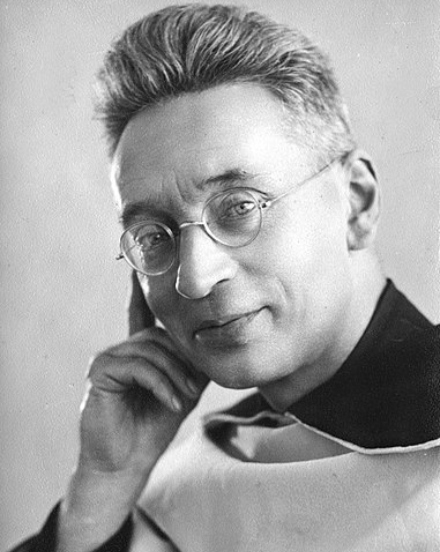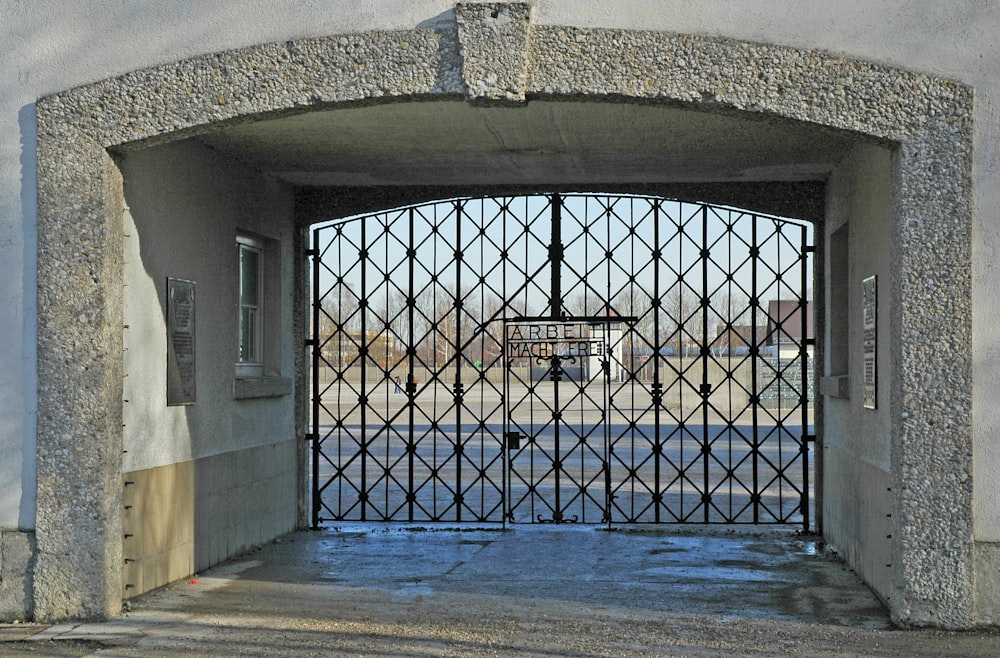The Life of St. Titus Brandsma - Carmelite Martyr for Truth
Jul 26, 2022 by Cheryl Hadley
St. Titus Brandsma was a Carmelite priest, professor, and writer. One of ten Carmelites martyred at Dachau during the Holocaust, this humble servant gave his life for truth and love. So relevant in our troubled times, he is an inspiration, model, and beacon of hope. Here is the story of the newest Carmelite saint:
Childhood on the Farm
Born in 1881, St. Titus Brandsma grew up on a dairy farm in the Netherlands. He lived a happy life of daily Mass, frequent Communion, farm work, and nights spent singing and dancing around the piano. His father taught the children to play and sing folk music and dance traditional polkas and mazurkas. More importantly, he instilled in his children a love for their Faith, their land, and their people.
Young Anno, as he was named, was a small boy who had difficulty keeping up with the more rigorous chores of the farm. He gave his best efforts but did not seem to have the strength and physical capacity of his siblings. Despite some physical disadvantages, he was pious, hardworking, and joyful.
Franciscan Seminarian
Feeling called to religious life at the age of only 11, he spent six years in the minor seminary with the Franciscans. Anno was well-liked by his classmates and a favorite of his professors, whom he impressed with his keen intelligence and strong academic performance.
He had a particularly engaging manner and was admired for his winsome nature. Classmates referred to him affectionately by the nickname "de Punt," or "Shorty." Despite his positive attributes and sterling academic achievement, the Dutch Franciscans rejected him after six years, believing his health was not vigorous enough for their way of life.

On to Carmel
Seventeen-year-old Anno was not deterred. He presented himself to the Dutch Carmelites, who happily accepted him. Spending his days in silence, prayer, fasting, and study, Anno lived an austere life, and wrote his family frequently, saying he was very happy.
He undertook a lifelong study of the works of St. Teresa of Ávila, whose contributions to the literature of mysticism are renowned in the Church, and began translating many of her works. He spoke his native Frisian, English, and French, and soon became well-known for articulating difficult concepts clearly.
He parlayed these gifts, encouraging fellow students to join him in producing articles on topics of the Faith. These he sold to magazines and newspapers, eventually creating one of his own. His in-house Carmelite magazine was a labor of love in his Community, eventually distributed to all Dutch Catholics.
As his work and the austere Carmelite lifestyle took its toll on his fragile constitution, he suffered continual bouts of intestinal difficulties and weakness. Beloved by his fellow friars, who eagerly agreed to assist him with his needs, he persevered.

Carmelite Priest and Professor
Ordained in 1905 at the age of 24, Anno took his father's name, Titus, as his name in religion. He received his Doctorate at the Gregorian University in Rome. His health continued to plague him, but he entrusted it to the Lord with joy and spiritual strength.
A gifted Catholic educator, he became Rector Magnificus, or head of the Catholic University of Nijmegen. As a professor and administrator, he ignited the faith and fanned the flame of zeal in many young people. Titus was also appointed to a term as the Rector of the Carmelite monastery established near the university.
He taught philosophy, theology, and mysticism. On the day after his term as Rector expired, his students paraded to the monastery by torchlight and gave him a rousing ovation. He had won not only their minds, but their hearts, for the Faith.
Call Within a Call
Three years later, in 1935, his Carmelite superiors asked him to undertake a lecture tour visiting the Carmelite foundations in the United States. Europe was on edge, living in fear of a second world war, and Titus set out for a Carmelite monastery in Ireland to better learn English before his tour.
His Irish confreres remember him as incredibly gentle, engaging, and warm. They enjoyed his sense of humor and marveled that this Dutchman unaccustomed to alcohol seemingly consumed their potent Irish Whiskey without any ill effects.
The Lord had given Titus a call within a call. Carmelite religious live cloistered from the world in monasteries. Drawing away from the finite, they enter into the Infinite. Most live contemplative lives dedicated to prayer, placing themselves at the service of the Church and souls.
Titus' Archbishop appointed him Spiritual Advisor to over 30 Catholic Dutch newspapers. The humble priest quickly earned their loyalty and trust. He combined his active and contemplative gifts, offering them for the service of God and mankind. This service would one day place him in the hands of the Nazis.

Speaking the Truth
When Hitler became Chancellor of Germany in 1933, Titus spoke out in the classroom and in the press against his despicable tyranny. The gentle and beloved Carmelite priest became a marked man. As the swastika shattered Holland, the Archbishop summoned Titus.
He laid out a dangerous but voluntary mission. The Nazis were forcing the Dutch newspaper editors to publish their hateful propaganda. The prelate asked Titus to visit the editors across the Netherlands, uniting them in opposition to Nazi demands.
Titus willingly began his mission, shadowed by the Nazis. "We have reached our limit. We cannot serve them. It will be our duty to refuse..." he wrote. The Nazis arrested Titus after 14 visits.

Photo by 23dingen voor musea/CC BY-SA 2.0
Time in Prison
From his cell he devised a schedule, and adhered to it as devotedly as he could. He knelt in prayer often, prayed the Office and read his Breviary, wrote poetry, completed six chapters of a biography of St. Teresa of Ávila, wrote two booklets ( My Cell, Letters from Prison) and composed a Way of the Cross for the local Shrine to St. Boniface.
The saint even scheduled time to smoke his pipe, which he much enjoyed. When guards confiscated the pipe, the gentle priest struck that time from his schedule serenely and moved on. He wrote to his Carmelite Superior, "I am very calm. I am happy and satisfied."
Prisoner 58 cut trees, removed stumps, and cleared a forest for Nazi shooting practice. The Nazis prohibited him from saying Mass, hearing confessions, spiritual counseling, and promoting God or religion. They beat to death or maimed priests who violated these rules, to prevent them from offering Mass or the Sacraments ever again.
.

Transferred to Dachau
Fr. Brandsma silently defied the regime, ministering in any way he could, including hearing confessions. Prisoners came to him day and night, longing for his encouragement and a sacramental blessing to strengthen them. While holding their hands, he would subtly make the Sign of the Cross on them with his thumb as a blessing.
The Gestapo continued to question Titus. His calm and truthful responses angered the Nazis, who transferred him to Dachau. There his gentle and imperturbable manner frustrated his captors. They beat him with clubs, boards, and their fists. They shoved him into the mud, gouged him, drawing blood, then left him wounded and alone. Father's delicate health was failing.
The Sacred Host was occasionally smuggled into camp. Once Titus received Jesus in the Eucharist in a tobacco pouch. Shortly thereafter, he was clubbed savagely by a guard. Titus refused to fully protect himself from the blows, instead protecting the concealed Eucharist with his arm against his body. This level of submission further enraged and confounded his assailant, who beat him savagely.
Eventually Titus dragged himself back to his bunk, where a fellow Carmelite, Brother Tijhuis, tried to comfort him.
"Thank you, Brother," Titus said, "but don't have pity on me, I had Jesus with me in the Eucharist."
Labor and Love
Titus was already suffering from uremic poisoning, a build up of toxins in the blood caused by kidney failure. The terrible conditions at the camp further weakened him. He suffered open sores and infected blisters on his feet, caused by hard labor in worn sandals. He was often unable to walk on his own.
Fellow prisoners carried Titus home at the end of the workday. Another imprisoned priest recalled how his cheerfulness and gentleness touched everyone as they grew to love the priest whose body was broken, but whose spirit modeled Christ.
Father encouraged the prisoners to pray for their captors. He exhorted them, "Do not yield to hatred. Be patient. We are here in a dark tunnel but we have to go on. At the end, the eternal light is shining for us."
Despite his circumstances, his last letter home read in part, "With me, everything is fine. You have to get used to new situations. With God's help, this is working out all right. Don't worry too much about me. In Christ, Your Anno."
Death in Dachau, Life in Christ
Eventually the guards remanded Titus to the infirmary, where the Nazis used the prisoners for gruesome experiments. Many died from this barbaric treatment. Those who survived were left unable to function and eventually euthanized. St. Titus became a victim of Nazi medical experimentation.
Titia, a nurse who tended him, reported that people were always trying to visit his bedside for consolation, and Father met each one with love.
She relayed what the doctor in charge of the experimentation told her about Titus, who confounded him by remaining serene, never offering any form of resistance: "One would think there was something utterly supernatural about him," the perplexed doctor mused.
On Sunday, July 26, 1942, Titia prepared to administer a lethal injection to Fr. Titus Brandsma. At various times during his infirmary stay, Father had spoken to her. He gave her a letter to smuggle out of camp, which she destroyed. He gave her pieces of paper with prayers and writings on them, which she lost. He also told her gently, "I pray for you a lot."
Model of Faith, Hope, & Charity
Titia later testified to the Ecclesial Tribunal for the cause of Father's canonization. She wanted to render a service to St. Titus, for the treatment he received at her hands.
She told the Tribunal that he gave her his rosary before his death. She responded to his gift by saying that she could not pray, and did not need it.
Titus did not lose hope in Titia even after hearing this reply. He encouraged her to take the rosary and recite the end of the Hail Mary, "pray for us sinners now and at the hour of our death."
"I started laughing then," Titia testified. "He told me that if I were to pray a lot, I would not be lost."
Titia told the Tribunal she would never forget the gentle face of the Carmelite saint in their final interaction, as she administered the lethal injection that killed St. Titus Brandsma.
Inspiration for Today
In his final moments, as in the rest of his inspiring life, this humble priest met the darkness of evil with the Eternal Light of Love. His life is a sign that man's quest for knowledge and his embrace of mystical realities are complementary paths to God and to truth. He reveals how the fruits of monastic life reach far beyond monastery walls, bringing an outpouring of grace into our broken world.
In a day when many distort the truth, so that discerning and speaking it can become complicated, the life of St. Titus reveals the importance of standing firm, regardless of the consequences. Witnessing to the truth sometimes costs us much - even our own lives - and St. Titus Brandsma surrendered his life in quiet love.
He inspires us in these challenging times, to know God and to make Him known. To accept the difficulties in our everyday lives with abandonment to God. To speak and stand for truth. To love, and to bring Christ's Love to others - no matter our circumstances or theirs.
St. Titus Brandsma, pray for us!
"They too are children of the kind God, and who knows if something won't stick to them?"
- St. Titus Brandsma, speaking of his Nazi tormentors at Dachau
[[34484,6035]]






